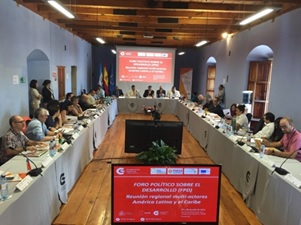The EU Supports Civil Society Organisations as Governance and Development Actors

date: 27/10/2017
In 2012, the European Union decided to push its long-standing support to Civil Society organisations (CSOs) in external relations a step further.
The European Commission set out its proposals for a renewed and more ambitious approach in its Communication "The roots of democracy and sustainable development: Europe's engagement with Civil Society in External Relations"[1].
In May 2017, the European Commission issued the report on "EU engagement with Civil Society"[2] and the Council endorsed it in its Council Conclusions[3].
CSOs contribute to boosting domestic accountability at local and national levels through a free, clear, and accessible flow of information and also nurture respect for the rule of law by monitoring effective implementation of laws and policies. By promoting the culture and values of democratic governance, CSOs give voice to citizens' concerns, including disadvantaged and marginalised groups, and work to further democracy. They also step in and play an important role in service delivery when circumstances require them to.
They are on the frontline in all crises, they are key partners in implementing a comprehensive agenda to tackle conflict and crises, focusing on fragility and human security, and targeting the most vulnerable. In the recent migration crisis, CSOs are major partners in implementing projects supporting migration policy development, labour migration, countering trafficking, migrant and refugee protection and rights, access to healthcare and action to enhance the positive impact of migration on development.
A challenging environment
Despite the increasing recognition of CSOs as partners in development, today, many face significant constraints, hampering their capacity to effectively contribute to governance, development, and poverty reduction. Numerous countries lack favourable legal and regulatory frameworks guaranteeing CSOs the right to operate independently and freely. As a result, CSOs often face increasing restrictions regarding the legal and policy frameworks within which they work, attempts to discredit or criminalise them, constraints on access to funds, intimidation and even physical harassment, detention and violent attacks.
EU objectives
In its 2012 Communication, the Commission puts forward the following objectives:
- To enhance efforts to promote a conducive environment for CSOs in partner countries.
- To promote a meaningful and structured participation of CSOs in domestic policies of partner countries, in the EU programming cycle and in international processes.
- To increase local CSOs' capacity to perform their roles as independent development actors more effectively.
Success achieved, so far!
In 2013, the European Commission set up a formal space for regular policy dialogue with CSOs. The new body, the Policy Forum on Development, fosters debate on European development policies and global agendas. The Forum meets once a year in Brussels as a multi-stakeholder trust-building mechanism promoting better understanding between representatives from more than 60 global and regional networks, the EU institutions and Member States. It contributes largely to the progressive achievement of Sustainable Development Goal (SDG) 17, "Strengthen the means of implementation and revitalize the global partnership for sustainable development".
The European Union signed 23 Framework Partnership Agreements (FPAs) with global and regional networks of CSOs in order to help them implement their respective actions and cope with various challenges related to capacities. FPAs illustrate in concrete terms the European Union’s commitment to support Civil Society Organisations, not only as providers of aid but also as pivotal actors of governance and key contributors to policy-making. Moving forward, these partnerships will be crucial in achieving the (SDGs).
At country level, the Country Roadmaps for Engagement with Civil Society present a coherent and shared EU analysis of the panorama of civil society, its enabling environment and the obstacles, constraints and opportunities faced by CSOs. By identifying EU priorities when engaging with and supporting CSOs in partner countries, the roadmaps improve the impact, visibility and consistency of EU dialogue, various policy sectors and operational support. As of the beginning of 2017, more than 100 Country Roadmaps have been finalised and are being implemented.
So far, more than 1100 projects supporting CSOs were implemented in 118 countries. They strengthened the meaningful and structured participation of CSOs in domestic policies, EU programming and international processes. They also led to concrete changes in constitutions and laws, on inequalities and poverty, and on day-to-day practices affecting citizens’ well-being or dignity.
As the leading donor for local CSOs in partner countries, the EU has helped mitigate the trend towards shrinking space for CSOs in public life and fundamental freedoms. Thousands of organisations have been able to carry out higher quality and more credible work. In turn, this has increased the number of lives they save, increased their impact on reducing poverty and helped them bring more structural improvements to the societies they work in.
Loïc Lallemand-Zeller and Elvis Humic
[1] European Commission Communication to the European Parliament, the Council, the European Economic and Social Committee and the Committee of the Regions, "The roots of democracy and sustainable development: Europe's engagement with Civil Society in External Relations", (COM (2012) 492), Luxembourg, October 15, 2012.
[2] European Commission, "Commission Staff Working Document: Report on EU engagement with Civil Society in External Relations", (SWD (2017)) 163/2), Brussels, June 9, 2017.
[3] Council of the European Union, "Council Conclusions on EU engagement with Civil Society in External Relations", Brussels, June 19, 2017.
